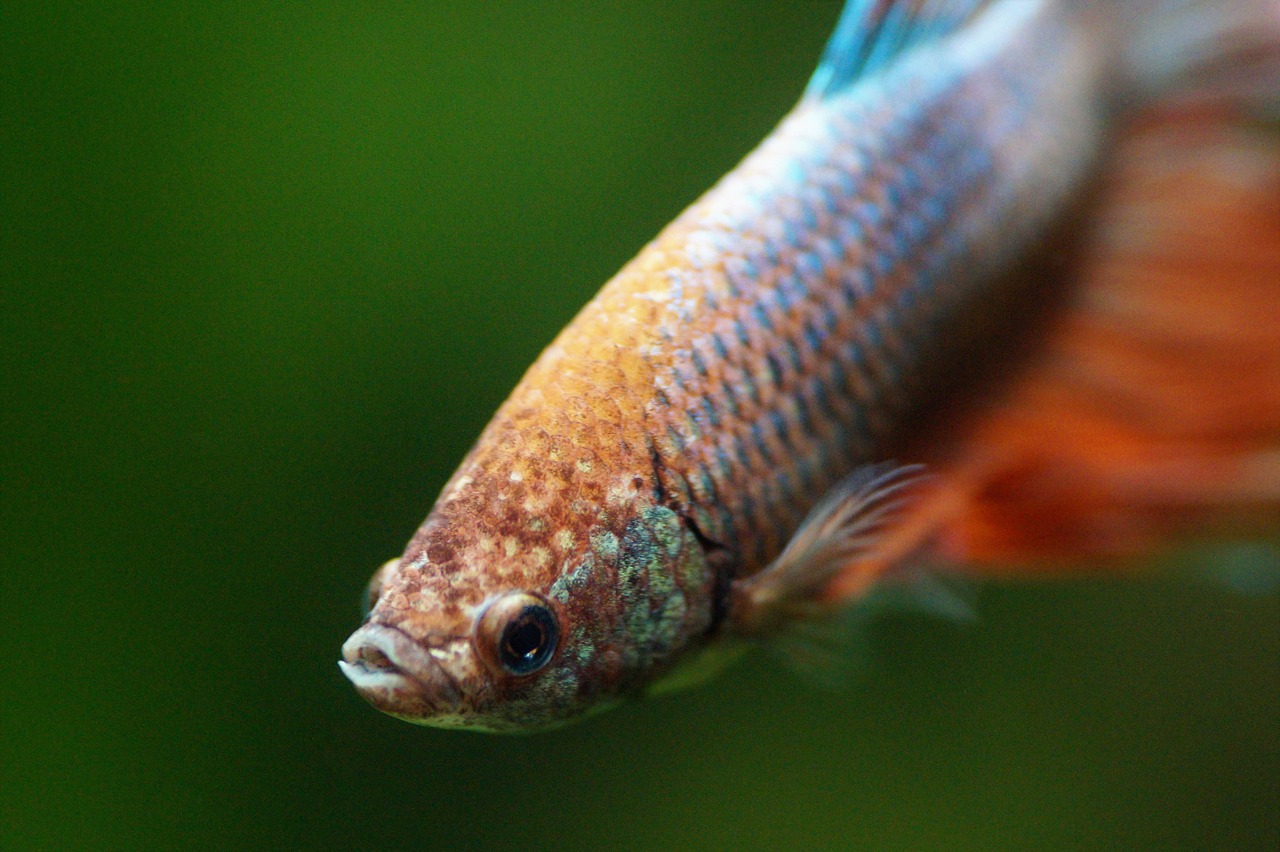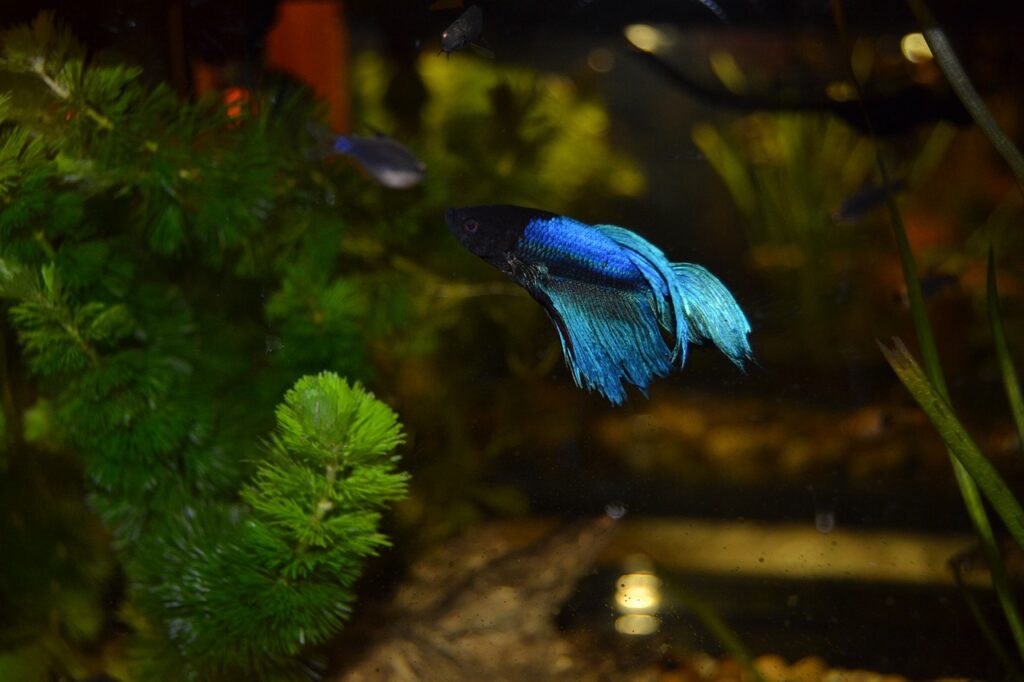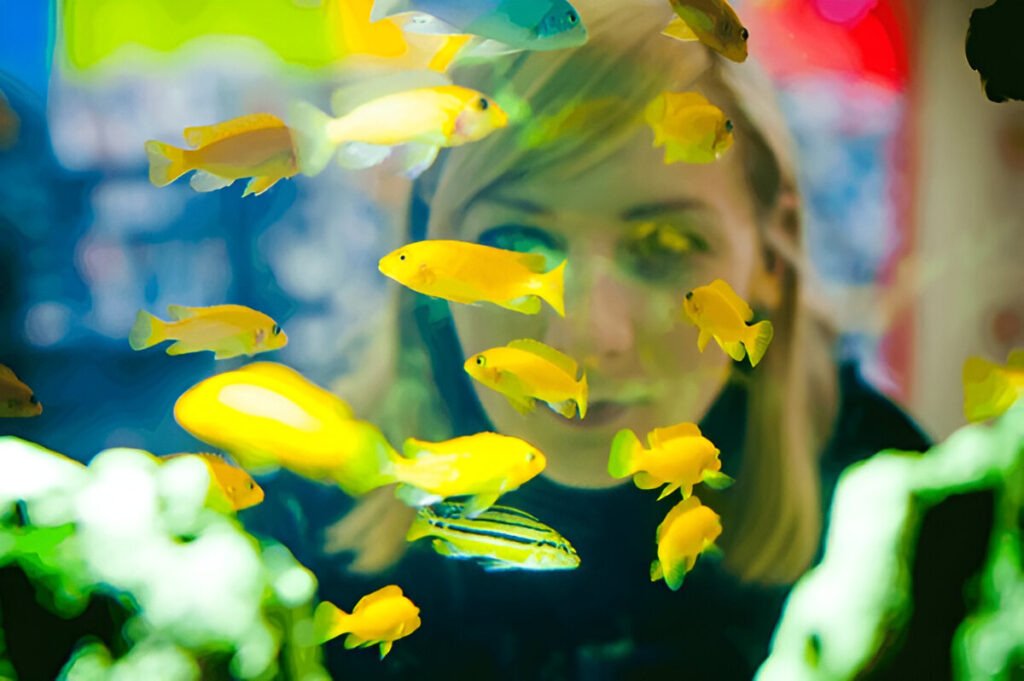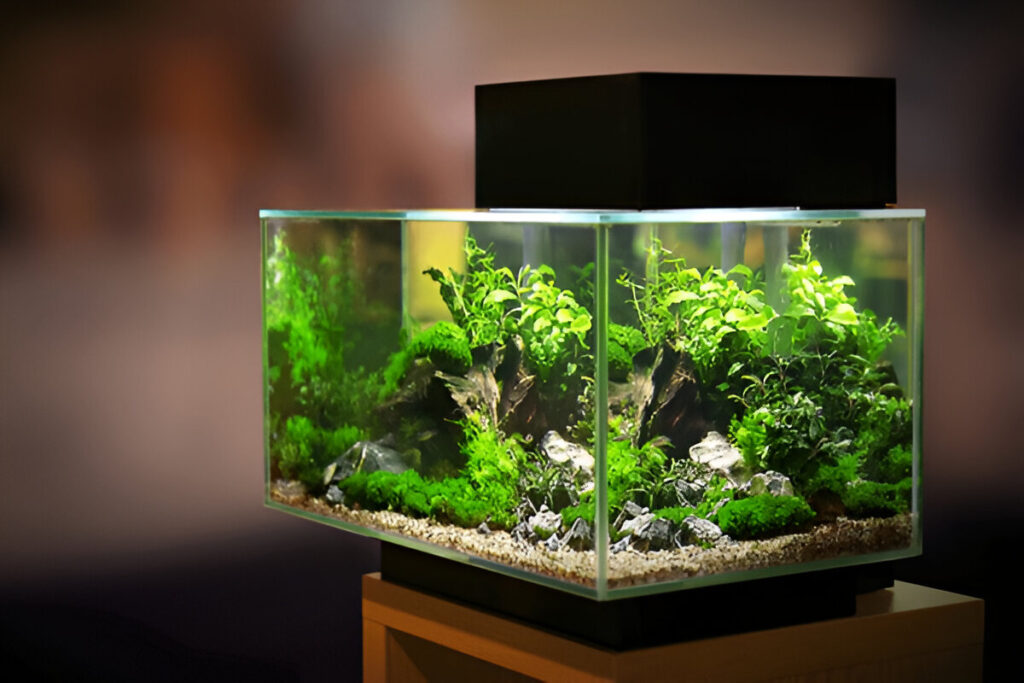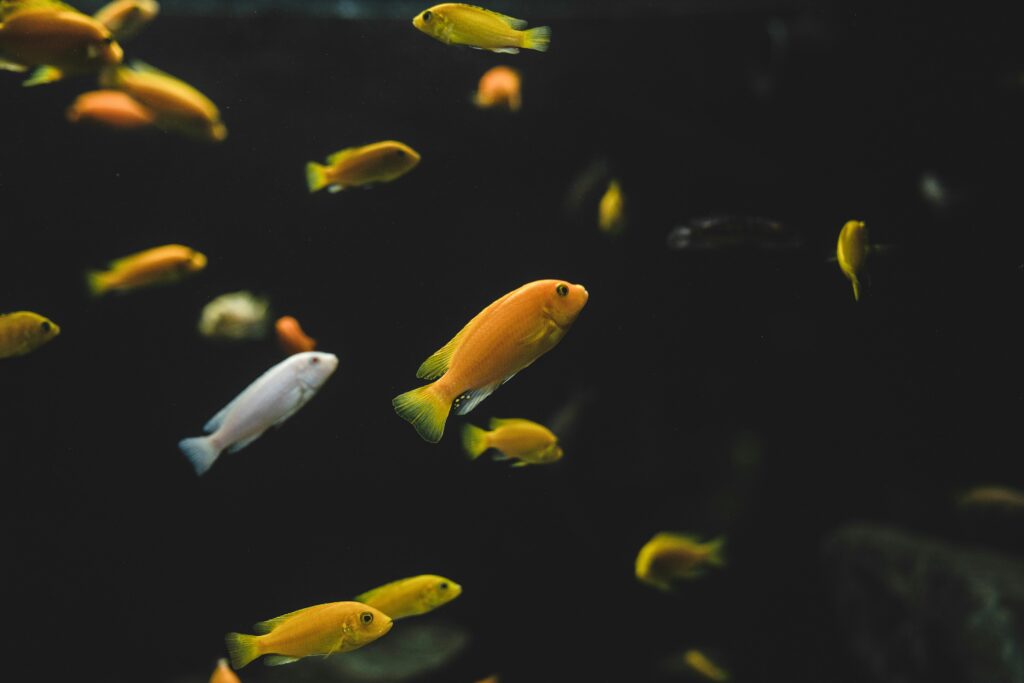How Long Can Betta Fish Go Without Food?
Betta fish, also known as Siamese fighting fish, are popular pets due to their vibrant colors and relatively low maintenance. However, like any living creature, they require proper care and attention, especially when it comes to feeding. Understanding how long betta fish can go without food is crucial for ensuring their health and well-being.
This blog will delve into the science behind a betta’s digestive system, the risks of prolonged fasting, factors influencing their ability to survive without food, and practical tips to ensure your betta is well-fed even when you’re away.
The carnivorous nature of betta fish requires very particular dietary needs. In the wild, they can survive catching insects and larvae or whatever small crustaceans happen to come their way. While in captivity, living well with high-quality betta pellets added with frozen or live foods is possible. Knowing how often one should feed a betta includes understanding the risk for under- or overfeeding-the essence of looking after a betta.
How Long Can A Betta Fish Go Without Food?
A betta fish can survive without food for about 10 to 14 days. This is, however, not advisable and may result in severe health complications. Though betta fish are resilient and can resist small periods of starvation, prolonged fasting may weaken their immunity and make them prone to diseases.
Feeding Schedule for Betta Fish
A typical feeding schedule for a betta fish would be once or twice a day. Each of these feedings should be in small portions, only the amount they are able to eat within 2-3 minutes. Overfeeding can cause obesity and water quality issues, while underfeeding can lead to malnutrition.
The Science Behind a Betta’s Digestive System and Metabolism
Knowing how a betta’s digestive system and metabolism works is necessary for giving them the best possible care. These biological processes will indicate how often and how much a betta should be fed so that it will always be healthy and bouncy.
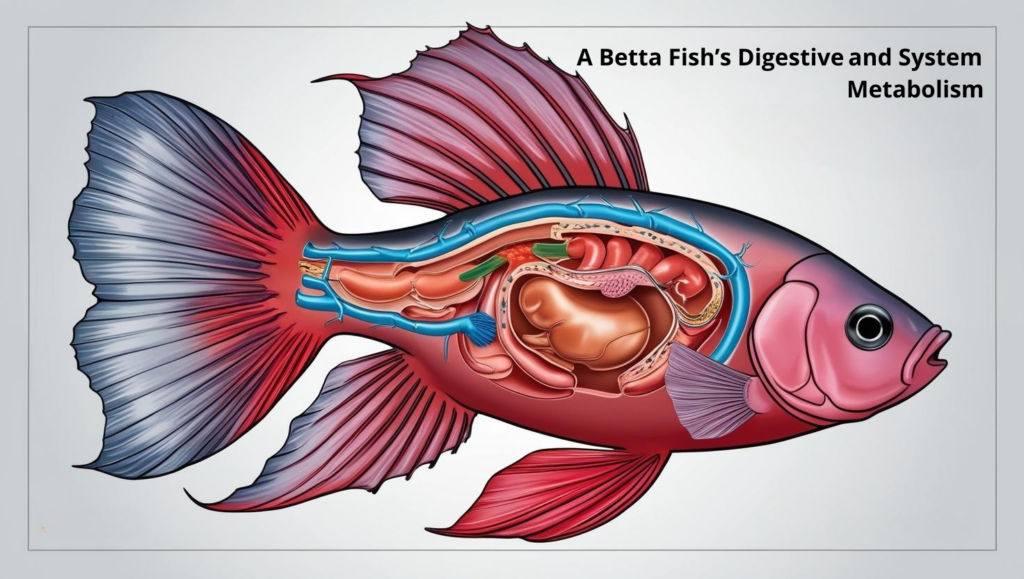
Betta Fish Metabolism
For such small and active carnivorous fishes, betta fish have a relatively fast metabolism. This would mean that transformation of food into energy is rapid and they would therefore need to be fed frequently to maintain their bodily functions. Several factors influence the metabolic rate of:
- Water Temperature: Being tropical fish, the metabolism of bettas is closely related to the temperature of their surroundings. In warmer water-76°F to 82°F-their metabolism increases, meaning they have to be fed more often. In cooler water, their metabolism slows down, and they do not need to eat as much.
- Age and Size: Younger bettas and fry have faster metabolisms because they grow and develop so fast. They need to eat more often than adult bettas. Older bettas might metabolize at a slightly slower rate and require fewer calories.
- Health and Activity Level: A healthy active betta has a higher metabolic rate than a stressed, sick, or lethargic one. Stressors such as poor water quality or overcrowding can slow their metabolism and reduce their appetite.
Knowing these factors will help you to adjust your betta’s feeding schedule according to their needs and ensure that they get the right amount of food at the right time.
The digestion process in a betta fish is comparatively faster compared to other bigger animals. It takes a betta approximately 24 hours to digest a meal completely. This simply means that the food taken today will be digested and excreted tomorrow.
Because of their fast digestion, bettas require a constant nutrient supply for energy and to maintain their bodily functions. Inconsistent feeding or skipping meals can lead to the depletion of energy and stress, which will eventually compromise health over time.
It’s also critical to remember that betta fish have small stomachs, roughly the size of their eyeball. They can only eat a little at one time. Too much food at once can put too much stress on their system and cause problems such as bloating or constipation.
How Often Do Bettas Eat?
In the wild, bettas are opportunistic feeders, taking small portions throughout the day as food becomes available. This grazing behavior helps them maintain a constant intake of nutrients for their energetic lifestyle.
This pattern is ideal to replicate in captivity but is often not practical. For owners, feeding the betta once or twice a day may be more convenient, in small portions that the fish are able to consume within 2-3 minutes. Such a schedule creates a compromise that works toward meeting their nutritional needs while trying not to overfeed them.
For the betta fry or younger fish, it would be necessary to feed them even more frequently to sustain their growth and development-three times a day. Whereas for grown-up bettas, they can survive with less frequency, especially when their diet consists of nutrient-enriched substances.
Key Takeaways
Water temperature, age, and health are variables that may affect metabolic rate and feeding. Thus, it would be sensible in captivity to feed them once or twice a day.
A betta has a fast metabolism where it needs more often feeding for sustaining its energy level.
It takes them about 24 hours to digest the food, which means they should be fed constantly to maintain health.
Pitfalls of Prolonged Fasting: What Happens to Betta Fish Without Regular Feeding?
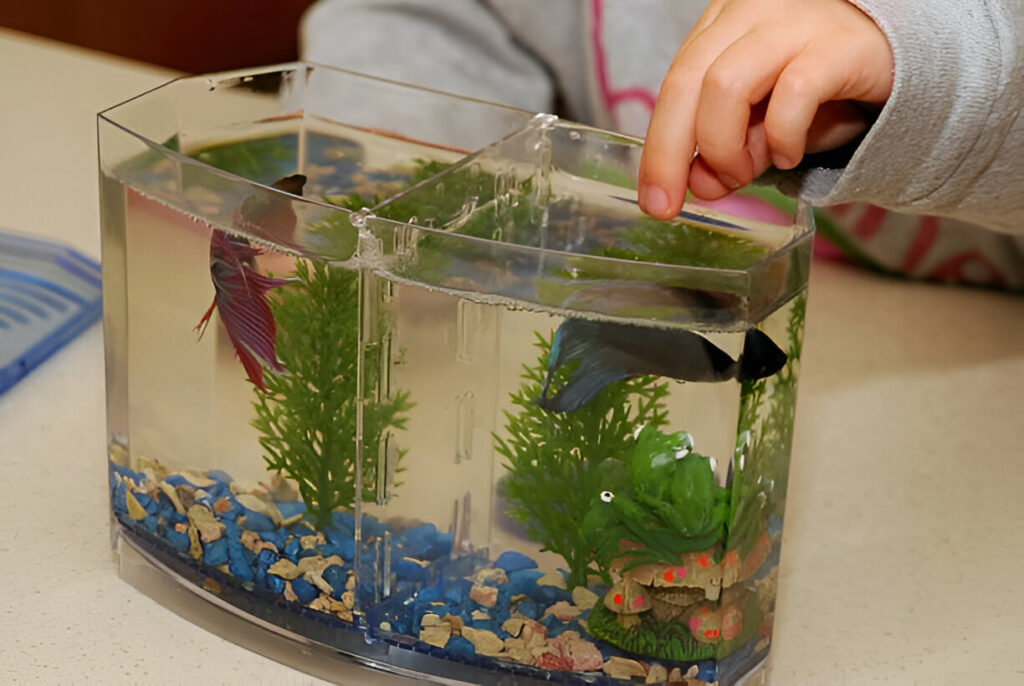
While betta fish are hardy and can survive short periods without food, prolonged fasting is detrimental to their health. Understanding the risks associated with not feeding your betta regularly is crucial for preventing long-term damage and ensuring their well-being.
Effects of Not Feeding Fish
When bettas do not eat for a long time, their body starts to draw on the stored energy resources for survival. This, though helpful at the beginning, can result in a number of negative effects, including:
- Weight Loss: As the betta’s body begins to break down fat and muscle tissue for energy, the fish will start to lose weight. A visibly thin betta with a sunken belly is a clear sign of underfeeding or starvation.
- Weakened Immune System: Starving of regular nutrition, the immune system of the betta becomes weak. A weak immune system makes the fish more prone to bacterial, fungal, and parasitic infections.
- Susceptibility to Diseases: Malnourished bettas are less capable of fighting against diseases, which increases the possibility of diseases such as fin rot, ich, or velvet.
A starving betta will show some physical and behavioral changes to show its distress. Such signs should never be ignored and show that the fish urgently needs nourishment. These include:
- Lethargy: When starved, a betta fish will generally be more passive and spend lots of time at the bottom or hidden amongst plants.
- Loss of Color: The coloration of bettas is one of their defining characteristics, and when not fed, that quickly fades as they become dull and pale.
- Less Activity: Starving bettas do not flare their fins anymore, neither do they explore or interact with the environment. They may show little to no interest in food when it is finally offered.
- Organ Failure and Death: The worst cases of starvation, if left for a long time, will cause vital organs to shut down and ultimately lead to death. As such, feeding problems must be solved as soon as possible.
Signs of Malnutrition in Fish
When a betta is either not fed right or fed inadequately, it develops malnutrition. Of course, this could be with regular feeding, yet on the wrong foods. Common indicators of poor nutrition in bettas are as follows:
- Fin Rot: Lack of essential nutrients can make a betta’s fins more prone to fin rot – a condition allowing the fins to be frayed or discolored.
- Bloating: Ironically, malnutrition can sometimes cause bloating due to digestive problems or the consumption of inappropriate foods.
- Dull Appearance: A malnourished betta will lose its bright colors and may develop a rough or uneven texture on its scales.
- Stunted Growth: In young bettas, this can mean that they will not grow to the full size that they should have reached.
Prolonged fasting doesn’t just affect the energy level of a betta but causes far-reaching effects on the overall health condition of the animal. These include:
- Digestive Problem: If a betta is not fed for a long time, then its digestion system gets disrupted, which may further lead to problems like constipation, bloating, or swim bladder disorder that affects fish’s swimming abilities.
- Weakened Immune System: As earlier identified, the dearth of nutrient intake weakens the immune capacity of the betta and reduces its fighting efficiency against any infection or disease.
- Stress and Behavioral Changes: Hunger constitutes one of the major stress factors for betta fish. Longer durations of fasting have a tendency to increase the levels of stress that may turn into erratic swimming, aggression, or even hiding.
- Increased Vulnerability to Environmental Changes: A malnourished betta has a poor chance of dealing with changes in water quality, temperature fluctuations, or any other kind of environmental stress.
Preventing the Pitfalls of Prolonged Fasting
To avoid such negative consequences of prolonged fasting, one should:
Plan for Absences: If you need to be away from home, use an automatic feeder or ask someone to feed your betta so that they do not go without food for too long.
Keep Them on a Feeding Schedule: Feed your betta once or twice a day. Give small portions that they can eat within 2-3 minutes.
Provide a Balanced Diet: Add high-quality pellets, frozen or live foods, and occasional treats to ensure your betta gets all the nutrients it needs.
Keep an Eye on Your Betta’s Health: Observe your betta regularly for any signs of malnutrition or illness and adjust their diet accordingly.
Factors Influencing How Long Bettas Can Last Without Food
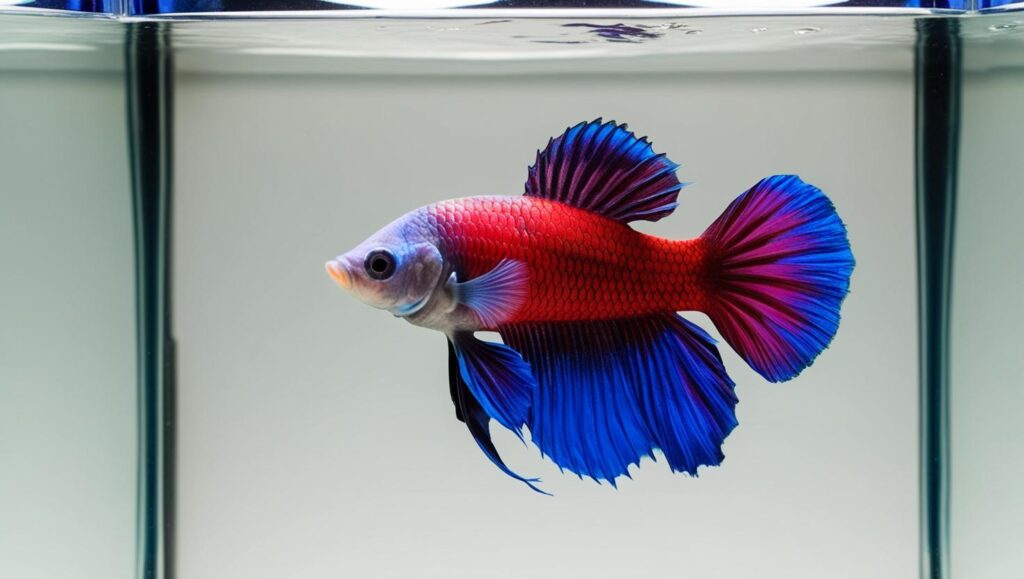
While betta fish are generally hardy and can survive without food for up to 10-14 days, there are a number of variables that may determine just how long it is safe for them to go without eating. Knowing these variables will better prepare you to make informed decisions concerning your betta’s care, especially if you will be away from home for some time and unable to feed him regularly.
The environment in which your betta lives plays a very important role in their ability to go without food for an extended period of time. A well-kept tank minimizes stress and bolsters their health, thus fasting is less harmful to them.
Some environmental factors include:
- Water Quality: A betta requires clean, well-filtered water to sustain its health. Poor quality water will add to the stress of the fish, which is not helpful in its dealing with lack of food. Regular changes of water and efficient filtration are imperative.
- Tank Size and Setup: A betta that resides in a large, well-decorated tank with ample opportunities to hide and plants is less stressed compared to one in a small, bare environment. A stress-free betta is better equipped to handle short periods of fasting.
- Tank Mates Present: Aggressive or hyperactive tank mates will stress a betta, especially if they have not been fed for some time. Be sure your betta is in a quiet environment if you are going to be away.
Water Temperature and Feeding
Being tropical fish, bettas are sensitive to water temperature, which directly relates to their metabolism and feeding:
- Optimal Temperature Range: The ideal water temperature for betta fish lies between 76°F and 82°F (24°C to 28°C). In this range, the fish have an ideal rate of metabolism and must be fed frequently to keep their energy level up.
- Cooler Water: When the water temperature is below 76°F, the metabolism of a betta slows down. This lowers their need for food, thus enabling them to survive longer without eating. However, this may weaken the immune system of the fish if they have to stay in cold water for a long period.
- Warmer Water: In warmer water – above 82°F, the betta’s metabolic rate increases, making them hungrier. Under these conditions, going without food will affect their health sooner since they use up their energy stores more quickly.
Keeping the water temperature stable within the ideal range helps your betta cope better with short periods of not eating.
Age and Size Considerations in Fasting
The age and size of a betta also make much difference in deciding how long they will be able to survive without food.
- Juvenile Bettas: Young bettas and their fry have fast metabolisms from growth and development. Juveniles need to be fed up to three times a day and are less capable of withstanding periods of fasting compared to adults. This may lead to stunted growth or developmental issues if the meals become too infrequent.
- Adult Betta Fish: As they grow older, their metabolisms tend to be slower, and they could sustain themselves during shorter periods of famine. But the regular provision of food will grant health and energy.
- Size and Energy Reserves: The larger a betta is (in size), and the healthier the animal is regarding stored fat and muscle reserves, the longer it can last without food. Any already skinny or malnourished specimen will not survive that long without food.
Other Things to Consider
- Health Status: A healthy betta, with no underlying problems in his health, will always be able to tolerate the fasting period much better than one that is already sick or stressed. Pre-existing conditions can heighten the negative effects of not eating.
- Activity Level: Active bettas burn more energy and may require more frequent feeding compared to less active individuals. If your betta is particularly lively, they may struggle more during periods without food.
- Diet Pre-Fasting: A betta that has been fed a nutritionally sound diet prior to fasting will have more stored energy to utilize. On the other hand, a malnourished betta has a lower threshold for being unable to find food.
Key Takeaways
Health status, activity level, and past diet also come into consideration regarding the chances of survival for a betta in a foodless environment.
Environmental factors include water quality, tank size, and/or tank mates affecting how well a betta copes with fasting.
Water temperature can have a serious effect on a betta’s metabolic and feeding rate: cooler water depresses metabolism, while warmer water accelerates it.
Age and size should be taken into account-younger, smaller bettas need more frequent feeding and can hardly endure fasting periods like grown-ups.
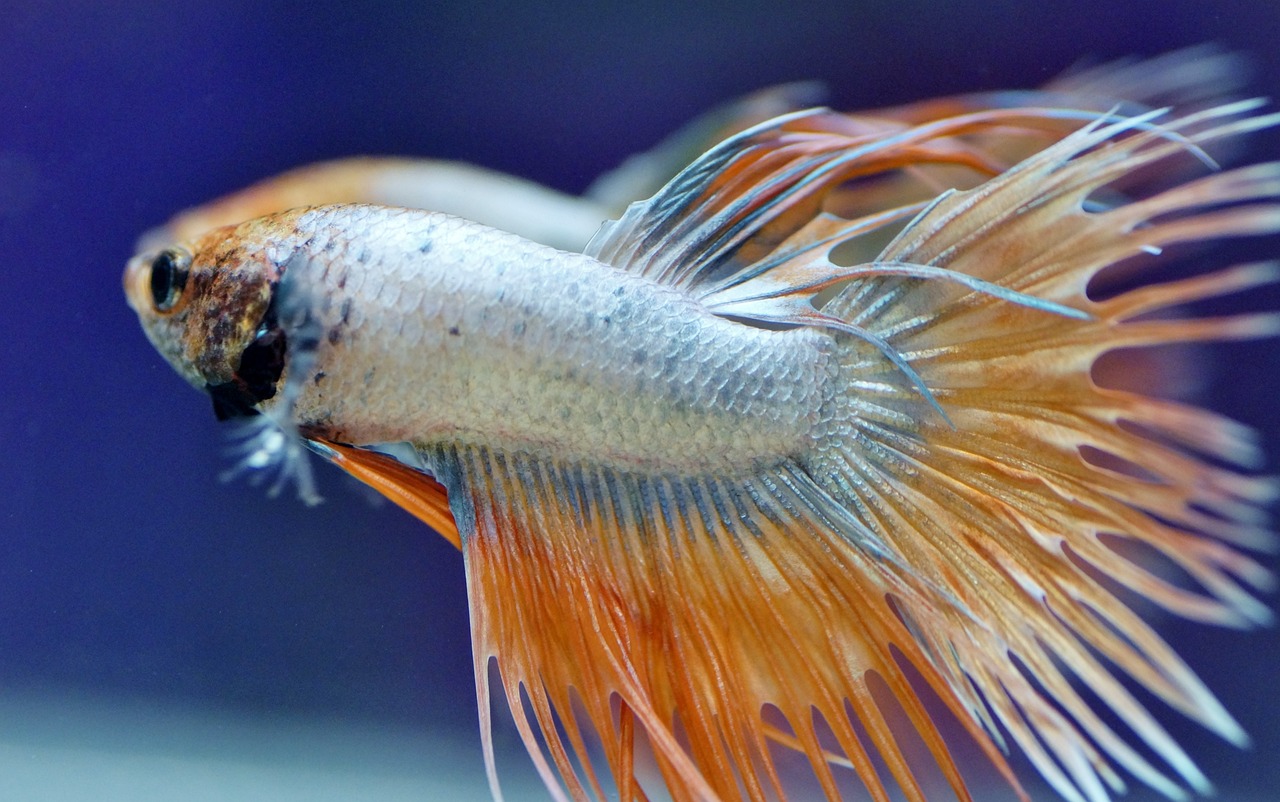
Avoiding Unnecessary Worry: Tips to Ensure Your Betta is Well-Fed During Absences
Image by ivabalk
If you need to be away from home for a few days, there are several ways to ensure your betta remains well-fed.
Feeding Solutions When Away from Home
One option is to use an automatic feeder, which can dispense food at predetermined intervals. These devices are especially useful for longer absences.
Automatic Feeders for Aquarium Fish
Automatic feeders can be programmed to release a specific amount of food at set times. This ensures that your betta receives regular meals even when you’re not around.
Preparing Your Tank for Short Trips
For short trips, you can prepare your tank by performing a partial water change and ensuring the water parameters are optimal. You can also feed your betta a slightly larger meal before you leave, but be cautious not to overfeed.
Conclusion:
Balancing Care with Practicality—Ensuring Your Betta’s Well-Being
Understanding how long betta fish can go without food is essential for responsible pet ownership. While bettas are hardy and can survive short periods without food, prolonged fasting can lead to serious health issues. By understanding their digestive system, recognizing the signs of malnutrition, and taking practical steps to ensure they are well-fed during your absences, you can provide the best care for your betta fish. Balancing care with practicality will ensure your betta remains healthy and vibrant, bringing you joy for years to come.
Yuns Legdm is a passionate advocate for pet care and the founder of this website, dedicated to providing valuable information for fellow pet lovers and veterinary professionals worldwide. With a deep love for animals, Yuns created this platform to connect passionate pet owners with expert insights from veterinarians around the globe.
This website grows with you—the passionate pet owners and veterinary experts—creating a trusted space where knowledge, experience, and love for animals come together. Whether you’re seeking advice on pet health, nutrition, or general well-being, this platform is here to support you on your journey of responsible and loving pet care.

